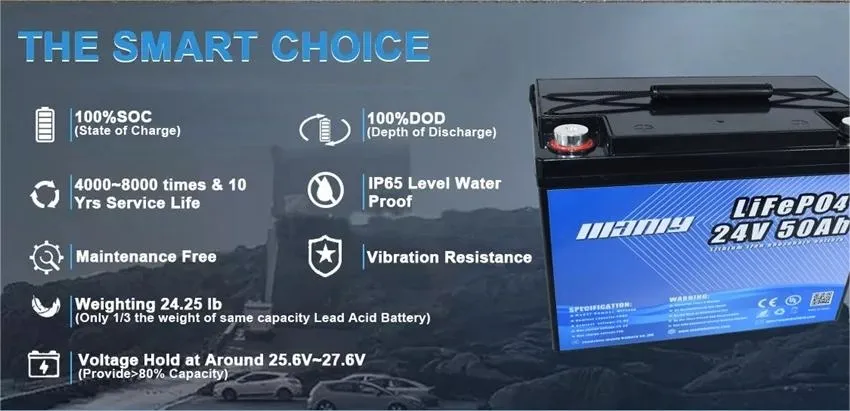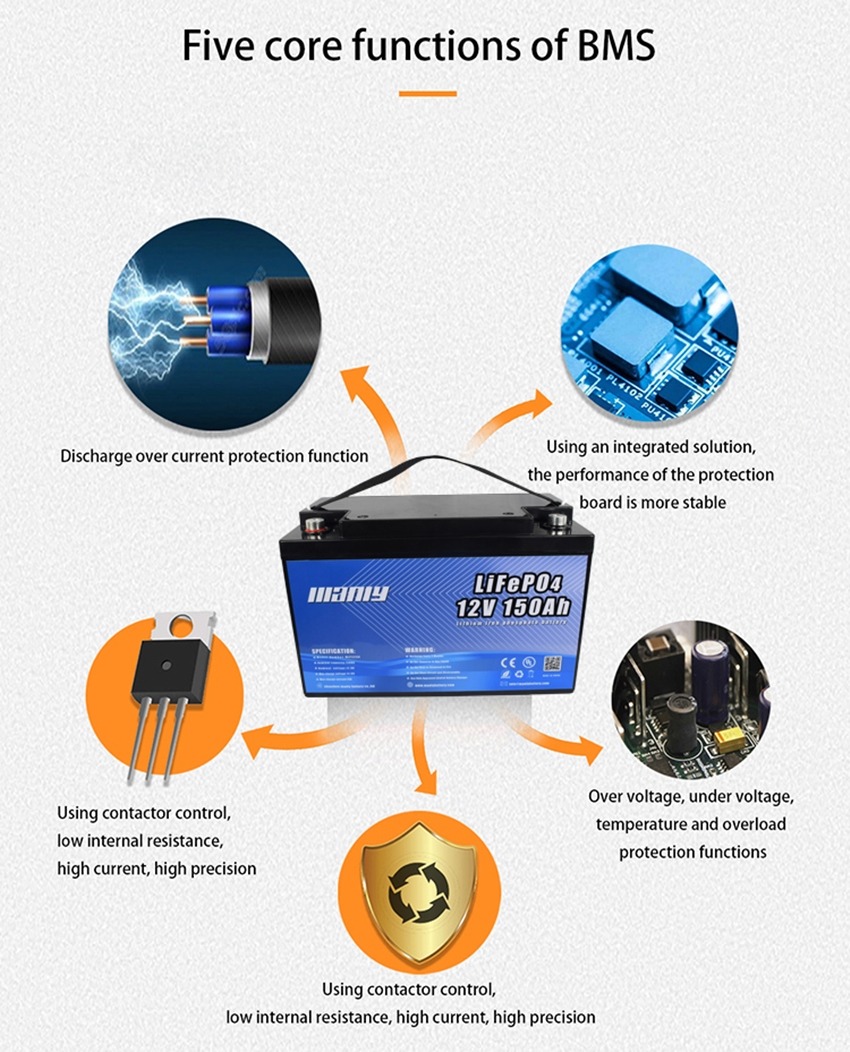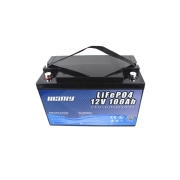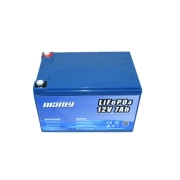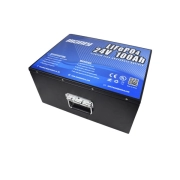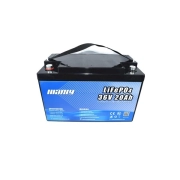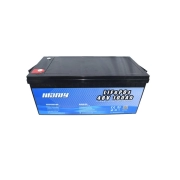24V Lithium Battery: The Essential Growing Guide
Table of Contents
- 24V Lithium Battery: The Essential Growing Guide
- Lithium-Ion Batteries and Their Importance
- Types of a 24V Lithium Battery
- Advantages of a 24V Battery
- The 24V Lithium Battery Application Scenarios
- Design Considerations for a 24V Lithium Battery
- Manufacturing Process of a 24V Battery
- Materials and Components of a 24V Lithium Battery
- Battery Assembly and Testing
- Battery Management Systems (BMS) for a 24V Lithium Battery
- Environmental Considerations in the 24V Lithium Battery Manufacturing
- Future of 24V Lithium Batteries
- MANLY Battery’s Effort to Provide High-Quality Batteries
- Hot Picks:
- Contact Us
The realm of energy storage is seemingly intricate, but the 24V lithium battery is simplifying it with all its powerful features and specifications. These batteries are excellent energy storage options for a wide variety of applications, including consumer electronics and electric vehicles to name only a few.
That’s why we decided to craft this post to stress the significant importance of the 24V battery. We will discuss everything you need to know about these batteries, including their inner components, types, advantages, applications, design considerations, and more.
Lithium-Ion Batteries and Their Importance
Lithium-ion batteries are critical for energy storage and supply. Among them, the 24V lithium battery is a versatile and widespread option. They empower innumerable pieces of equipment in different industries such as consumer electronics and electric vehicles.
A 24V battery normally works at a nominal voltage of 24 volts to bring power and capacity to equilibrium. This voltage level is important because it matches the electrical requirements of the majority of the devices/equipment.
What makes the 24V battery special is the fundamental principles behind how it stores energy. It stores and releases energy through the movement of lithium ions between positive and negative electrodes. This reciprocating mechanism enables efficient and rechargeable power storage in these batteries for a long time.
Battery suppliers and manufacturers should vividly comprehend the complexities of how a 24V lithium battery works and stores energy. This helps them manufacture reliable lithium batteries that offer enduring storage solutions and maximum capacities.
Types of a 24V Lithium Battery
There are diverse 24V lithium-ion batteries on the market. It’s crucial for both battery suppliers and consumers to learn about this diversity. These batteries are offered in distinct chemistries with unique characteristics, which makes them appropriate for diverse applications.
The different chemistries of a 24V battery include the following options that are more widespread in different industries:
- LiFePO4: Lithium iron phosphate
- LiMn2O4: Lithium manganese oxide
- LiCoO2: Lithium cobalt oxide
- LiNiCoMnO2: Lithium nickel cobalt manganese oxide
Each of these chemistries comes with its own benefits and drawbacks, including energy density, cycle life, and safety. This massive diversity makes these batteries easily useful in distinct industries such as automotive and renewable energy.
If you need to correctly choose a 24V battery type, you need to comprehensively assess your needs and application requirements. As an example, LiFePO4 batteries might be the best option if you’re looking for high energy density and long cycle life. On the other hand, LiMn2O4 batteries will provide you with a balance between capacity and cost-effectiveness.
Battery suppliers play an undeniable role in offering these diverse 24V battery options. They provide various chemistries and in addition to that, help you determine the most appropriate battery type for your specific needs.
Advantages of a 24V Battery
A 24V lithium battery comes with several advantages that together make it an attractive option for many applications. It’s critical for battery suppliers and consumers alike to know about these benefits if they need an efficient/reliable power source.
First of all, a 24V lithium battery presents incredible energy density. It can fill a huge amount of energy inside a compact and light structure. This makes it a superior choice when space and weight are limited and critical. The high energy density of these batteries allows them to operate for a longer time, regardless of the device you’re using them for.
What’s more, a 24V battery offers terrific charge/discharge efficiency. To rephrase it, it can powerfully store or release energy and minimize wasted power. This will simply lead to an extended battery life and minimized operating costs in the long run. These advantages are infinitely valuable for businesses and industries that mainly use these batteries for their functions.
Moreover, a 24V lithium battery offers a low self-discharge rate. In other words, it can keep its stored energy for a longer time when it’s not being used. This helps consumers always have the power they need. It’s a critical advantage for backup power applications and devices with periodic usage patterns.
Battery suppliers vividly know how important these advantages are. That’s why they continuously work to provide dedicated 24V battery options that handle the requirements of diverse applications and industries.
The 24V Lithium Battery Application Scenarios
The applications of a 24V battery are different when used in different industries. These batteries aren’t single-purpose; they’re used as a power source for myriad devices and systems.
- Electric Mobility: This is where a 24V lithium battery is widely used. Electric scooters, bicycles, and even small electric vehicles use a 24V battery to offer an eco-friendly form of transportation. In these devices, lithium batteries combine power and energy storage capacity.
- Renewable Energy: The 24V lithium battery also plays an unquestionable role in the renewable energy sector. Solar power systems and wind energy installations are usually powered by these batteries for energy storage. They capture/store excess energy during peak production times and release it when demand is high. This leads to stabilized power supply and a more sustainable energy grid.
- Industrial Applications: These batteries are also used in industrial applications as they power material handling equipment such as forklifts and automated guided vehicles (AGVs). They offer quick charging and long operational hours to maximize productivity and minimize downtime.
- Marine Industry: The 24V battery is also used in the marine industry as it empowers electric boats and yachts. Its lightweight and high-capacity specifications make it great for your needs on open water.
Design Considerations for a 24V Lithium Battery
Designing a 24V lithium battery system needs various considerations if you want it to provide optimal, safe performance. Battery suppliers and engineers consider several primary factors to create batteries for specific applications.
The 24V output voltage is the key feature of these batteries which must meticulously match the requirements of the intended application. If the battery is meant to be used as a backup power system for telecommunications, or even if that’s for a mobility scooter, its voltage must align with the required voltage.
In addition, capacity is also a fundamental feature of these batteries. It’s often measured in ampere-hours (Ah) and shows the amount of energy the battery can store. It’s important to choose the right capacity so the battery can last long without being recharged. For proper portability, it’s essential to balance capacity with size and weight limitations.
Thermal management and safety features are also critical in the design of a 24V lithium battery. It’s integral to manage the heat generated during charging/discharging cycles to prevent overheating and make the battery operate safely. Safety mechanisms such as overcharge protection and thermal cutoff are critical to prevent overheating or overcharging.
What’s more, environmental conditions and usage patterns should also be considered. These batteries should be designed to withstand changing temperatures, humidity levels, and mechanical stresses to maintain proper performance.
Manufacturing Process of a 24V Battery
The production of a 24V lithium battery is an intricate process that needs careful attention to detail. Battery suppliers follow strict steps to create high-quality batteries with industry standards.
The manufacturing process normally starts with assembling battery cells. These cells shape the foundation of the battery pack, hence chosen meticulously based on their quality and performance. Then, they’re grouped and connected to provide the intended voltage and capacity.
Quality control is paramount at every stage of the production. Manufacturers go through strict testing procedures to evaluate the performance and safety of the cells. This helps them detect any potential issues. Correctly-manufactured cells are then sent for assembly, while others are rejected.
Within the assembly stage, cells are covered with protective casings to combine cooling and thermal management systems and integrate safety features such as circuit protection and voltage monitoring. The assembly process must be followed precisely to ensure batteries will perform safely.
It’s critical for battery suppliers to comply with industry standards. They must stick to different international standards and regulations to guarantee the quality, safety, and environmental sustainability of their products. Examples of such standards include ISO 9001 for quality management and ISO 14001 for environmental management.
Materials and Components of a 24V Lithium Battery
There are different materials and components inside a 24V battery. Altogether, these components determine the performance, longevity, and safety of the battery.
Essential materials used in these batteries are:
- Cathodes
- Anodes
- Electrolytes
Cathodes usually include lithium cobalt oxide (LiCoO2), lithium iron phosphate (LiFePO4), and different other compounds. Anodes, on the other hand, may consist of graphite, silicon, or other carbon-based materials. The selection of these materials integrally affects the energy density, cycle life, and overall performance of the battery.
The role of these materials is crucial in the operation of batteries. During charging/discharging cycles, lithium ions pass through the electrolyte between the cathode and anode. This movement is what helps the battery store/release energy. Advancements in the manufacturing of these materials will certainly enhance the energy density, charging speed, and overall efficiency of a 24V battery.
Various materials used in these batteries offer trade-offs between energy density and safety. For instance, some cathodes provide high energy density but may be irresistible to thermal shocks. Battery suppliers must understand these trade-offs to maximize the performance and safety of their batteries.
Battery Assembly and Testing
The assembly and testing phases are crucial in the production of 24V batteries to make sure the products offer the highest quality and performance. The precise processes in these phases turn battery components into functional means of storing energy.
Battery assembly initiates with placing the cells into a protective casing. This step must be performed meticulously for optimal cell alignment and electrical connections. Also, thermal management systems are used in this phase to prevent overheating and retain safety.
Then, comprehensive testing procedures start. During this phase, different parameters are evaluated, including capacity, voltage, and internal resistance. Safety features such as overcharge and over-discharge protection are also strictly tested to prevent hazards.
Quality is constantly checked throughout assembly and testing. Manufacturers do this strictly to identify any deviations from standards. Batteries that pass all tests are prepared for packaging.
Some common challenges in the assembly and testing phases are preserving consistent quality and discovering any manufacturing issues quickly. Battery suppliers use modern automation and quality control technologies to overcome such challenges properly.
Battery Management Systems (BMS) for a 24V Lithium Battery
Battery Management Systems (BMS) are critical components that play an undeniable role in the safe operation of a 24V battery. These systems monitor and manage different aspects of the performance and health of the battery.
BMS in 24V lithium-ion batteries are extremely critical as they ensure the battery operates with safe voltage and temperature. The absence of such a system may lead to overcharging and over-discharging, which can result in damage, shorter lifespan, or safety hazards. BMS also shows real-time data on the battery’s charge and health status.
Features and functions of BMS include:
- Cell Balancing: This feature distributes the charge evenly among various cells to lengthen the battery life.
- Fault Detection and Isolation: This feature can determine and fix issues that may arise during the battery’s operation.
- Communication with External Devices: BMS can communicate with devices such as chargers or electronic control systems in electric vehicles to optimize the charging/discharging process.
It’s vital for battery suppliers to incorporate BMS into 24V batteries to comply with safety standards and produce high-quality batteries. Both manufacturers and consumers must understand the role of BMS to ensure the longevity of these batteries.
Environmental Considerations in the 24V Lithium Battery Manufacturing
Environmental problems are critical in the production of 24V lithium batteries. These considerations revolve around various aspects such as the selection of materials and the recycling practices of these batteries.
Sustainability in such processes starts with responsible sourcing of raw materials. Suppliers must look for ethically sourced materials and choose recycling programs to minimize the environmental impact of resource extraction. This helps them lower their carbon footprint and promote ethical supply chains.
Recycling and disposal practices are integral in the lifecycle of a 24V battery. Second-hand batteries usually contain useful materials like lithium, cobalt, and nickel. These materials can be extracted/reused in the production of new batteries. Recycling preserves natural resources, prevents the environmental impact of mining, and decreases dangerous waste.
Manufacturers constantly try to use eco-friendly materials/processes in battery production. They tend to produce batteries with lower carbon footprints and harmful chemicals to create a cleaner and greener energy solution.
Currently, battery suppliers are doing research to enhance the recyclability of battery components and decrease the environmental footprint of manufacturing processes. This matches the global endeavors to combat climate change and leads to a greener future for the energy storage industry.
Future of 24V Lithium Batteries
The future of 24V lithium-ion batteries is exciting as it depends on new technological advancements, varying consumer needs, and a deeper focus on sustainability.
Technological upgrades can significantly affect the future of these batteries. Researchers and manufacturers constantly endeavor to enrich the performance, safety features, and energy density of batteries. Innovations such as solid-state lithium-ion batteries can increase the energy a battery can store and improve its safety.
However, there are several challenges ahead. One of them is the availability and ethical sourcing of raw materials such as lithium and cobalt. It’s necessary to handle these challenges and find alternative materials with analogous efficiency.
The battery production industry will certainly deviate toward cleaner energies. Electric mobility will become increasingly popular as electric vehicles will become inexpensive and accessible. Also, the integration of 24V lithium batteries into decentralized energy systems will raise energy independence and stability.
The future of 24V lithium batteries will presumably be more sustainable and electrified. As the industry handles these changes, battery suppliers and customers should adapt themselves to the advancement of technology and sustainability procedures.
MANLY Battery’s Effort to Provide High-Quality Batteries
MANLY Battery is a key player in wholesale battery production, with over 13 years of distinctive expertise. The company’s cutting-edge facilities are distributed across essential Chinese cities. It’s committed to transforming the future of 24V lithium-ion batteries.
The company produces 6MWh of battery cells and packs in addition to assembling over 3,000 batteries on a daily basis. Manly Battery specializes in 6V to 72V LiFePO4/lithium-ion batteries for distinct applications, especially the 24V variant which is crucial for solar energy storage, industrial solutions, advanced robots, and uninterrupted power supply
MANLY Battery has put a deep focus on customizability. It provides great flexibility in voltage, capacity, and aesthetics to make sure the products fit the client’s specifications perfectly. The company is globally trusted and is equipped with various certifications.
The durability and reliability of MANLY Battery’s products are observable in its decade-long warranty. It provides various safety features such as short circuit and overcharge protection. The company’s LiFePO4 batteries also come with a remarkable energy efficiency rate of 95%.
The capabilities of MANLY Battery aren’t confined to just power; it delivers a modern user experience with features such as Bluetooth connectivity and an intuitive battery level display. This way, the company aims to shape the future of efficient energy in the realm of 24V lithium-ion batteries.

